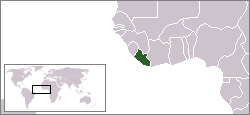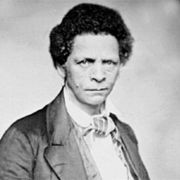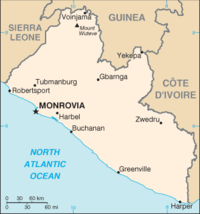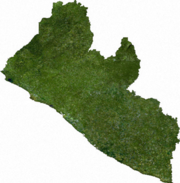Liberia
2007 Schools Wikipedia Selection. Related subjects: African Countries; Countries
| Republic of Liberia | |||||
|
|||||
| Motto: "The love of liberty brought us here" | |||||
| Anthem: All Hail, Liberia, Hail! | |||||
| Capital (and largest city) |
Monrovia |
||||
| Official languages | English | ||||
|---|---|---|---|---|---|
| Government | Republic | ||||
| - President | Ellen Johnson-Sirleaf | ||||
| - Vice-President | Joseph Boakai | ||||
| Formation | by African-Americans | ||||
| - ACS colonies consolidation |
1821- 1842 | ||||
| - Independence | 26 July 1847 | ||||
| Area | |||||
| - Total | 111,369 km² ( 103rd) 43,000 sq mi |
||||
| - Water (%) | 13.514 | ||||
| Population | |||||
| - July 2005 estimate | 3,283,000 ( 132nd) | ||||
| - Density | 29/km² ( 174th) 75/sq mi |
||||
| GDP ( PPP) | 2005 estimate | ||||
| - Total | $2.903 billion ( not ranked) | ||||
| - Per capita | $900 ( not ranked) | ||||
| HDI (2003) | n/a (unranked) ( n/a) | ||||
| Currency | Liberian dollar1 ( LRD) |
||||
| Time zone | GMT ( UTC) | ||||
| Internet TLD | .lr | ||||
| Calling code | +231 | ||||
| 1 United States dollar also in common usage. | |||||
Liberia, officially the Republic of Liberia, is a country on the west coast of Africa, bordered by Sierra Leone, Guinea, and Côte d'Ivoire. Liberia, which means "Land of the Free," was founded as an independent nation for free-born and formerly enslaved African Americans. Recently it has witnessed two civil wars, the Liberian Civil War ( 1989– 1996), and the Second Liberian Civil War ( 1999– 2003), that have displaced hundreds of thousands and destroyed its economy.
History
Settlers from America
The American Colonization Society established Liberia as a colony for African-Americans in 1822. African-Americans gradually immigrated to the colony and became known as Americo-Liberians, where many present day Liberians trace their ancestry.
On July 26, 1847, the Americo-Liberian settlers declared the independence of the Republic of Liberia. The settlers regarded Africa as a " Promised Land," but they did not become reintegrated into an African society. Once in Africa, they referred to themselves as "Americans" and were recognized as such by local Africans and by British colonial authorities in neighboring Sierra Leone. The symbols of their state — its flag, motto, and seal — and the form of government that they chose reflected their American background and diaspora experience. Lincoln University founded as Ashmun Institute in 1854 played an important role in supplying Americo-Liberians leadership for the new Nation. The first graduating class of Lincoln University, James R. Amos, his brother Thomas H. Amos, and Armistead Miller sailed for Liberia on the brig Mary C. Stevens in April, 1859 after graduation.
The religious practices, social customs and cultural standards of the Americo-Liberians had their roots in the antebellum American South. These ideals strongly influenced the attitudes of the settlers toward the indigenous African people. The new nation, as they perceived it, was coextensive with the settler community and with those Africans who were assimilated into it. Mutual mistrust and hostility between the "Americans" along the coast and the "Natives" of the interior was a recurrent theme in the country's history, along with (usually successful) attempts by the Americo-Liberian minority to dominate people whom they considered uncivilized and inferior. They named the land "Liberia," which in European languages, and in Latin in particular, means "Land of the Free," as an homage to their freedom from slavery.
The founding of Liberia was privately sponsored by American religious and philanthropic groups, but the country enjoyed the support and unofficial cooperation of the United States government. Liberia’s government, modeled after that of the United States, was democratic in structure, if not always in substance. After 1877 the True Whig Party monopolized political power in the country, and competition for office was usually contained within the party, whose nomination virtually ensured election. Two problems confronting successive administrations were pressure from neighboring colonial powers, Britain and France, and the threat of financial insolvency, both of which challenged the country’s sovereignty. Liberia retained its independence during the Scramble for Africa, but lost its claim to extensive territories that were annexed by Britain and France. Economic development was retarded by the decline of markets for Liberian goods in the late nineteenth century and by indebtedness on a series of loans, payments on which drained the economy.
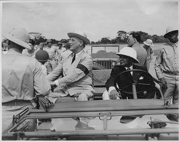
Significant mid-twentieth century events
Two events were of particular importance in releasing Liberia from its self-imposed isolation. The first was the grant in 1926 of a large concession to the American-owned Firestone Plantation Company; that move became a first step in the modernization of the Liberian economy. The second occurred during World War II, when the United States began providing technical and economic assistance that enabled Liberia to make economic progress and introduce social change.
1980 coup under Doe
In a late night raid on 12 April 1980, a successful military coup was staged by a group of noncommissioned Krahn officers led by Master Sergeant Samuel Kanyon Doe, and they executed the President of nine years William R. Tolbert, Jr. in his mansion. Constituting themselves the People’s Redemption Council, Doe and his associates seized control of the government and brought an end to Africa’s "first republic". Significantly, Doe was the first Liberian head of state who was not a member of the Americo-Liberian elite.
In the early 1980s, the United States provided Liberia more than $500 million for pushing the Soviet Union out of the country, and for providing the US exclusive rights to use Liberia's ports and land (including allowing the CIA to use Liberian territory to spy on Libya).
Doe favored authoritarian policies, banning newspapers and outlawing various opposition parties. His tactic was to brand popular opposition parties as "socialist", and therefore illegal according to the Liberian constitution, while allowing less popular minor parties to remain as a token opposition. Unfortunately for Doe, popular support would then tend to realign behind one of these smaller parties, causing them to be labeled "socialist" in their turn.
In October 1985, Liberia held the first post-coup elections, ostensibly to legitimize Doe's regime. Virtually all international observers agreed that the Liberia Action Party (LAP) led by Jackson Doe (no relation) had won the election by a clear margin. After a week of counting the votes, however, Doe sacked the count officials and replaced them with his own Special Election Committee (SECOM), which announced that Doe's ruling National Democratic Party of Liberia had won with 50.9% of the vote. In response, on 12th November, a counter-coup was launched by Thomas Quiwonkpa, whose soldiers briefly occupied the Executive Mansion and the national radio station, with widespread support throughout the country. Three days later, Quiwonkpa's coup was overthrown. Following this failed coup, government repression intensified, as Doe's troops killed more than 2000 civilians and imprisoned more than 100 opposing politicians, including Jackson Doe, Ellen Johnson-Sirleaf and BBC journalist Isaac Bantu.
1989 and 1999 civil wars
In late 1989, a civil war began, and in September 1990 Doe was ousted and killed by the forces of faction leader Yormie Johnson and members of the Gio tribe. As a condition for the end of the conflict, interim president Amos Sawyer resigned in 1994, handing power to the Council of State. Prominent warlord Charles G. Taylor was elected as President in 1997. Taylor's brutal regime targeted several leading opposition and political activists. In 1998, the government sought to assassinate child rights activist Kimmie Weeks for a report he had published on its involvement in the training of child soldiers, which forced him into exile. Taylor's autocratic and dysfunctional government led to a new rebellion in 1999. More than 200,000 people are estimated to have been killed in the civil wars. The conflict intensified in mid- 2003, and the fighting moved into Monrovia. As the power of the government shrank and with increasing international and American pressure for him to resign, President Charles Taylor accepted an asylum offer from Nigeria, but vowed: "God willing, I will be back." This statement proved correct on March 29, 2006, when he was extradited from Nigeria . He is expected to face 17 charges of war crimes and crimes against humanity before a United Nations tribunal holding proceedings in the Hague to address alleged crimes committed during the brutal civil war.
Transitional government and elections
After the exile of Taylor, Gyude Bryant was appointed Chairman of the transitional government in late 2003. The primary task of the transitional government was to prepare for fair and peaceful democratic elections. With UN and ECOMOG troops safeguarding the peace, Liberia successfully conducted presidential elections in the fall of 2005. Twenty three candidates stood for the October 11, 2005 general election, with the early favorite George Weah, internationally famous footballer, UNICEF Goodwill Ambassador and member of the Kru ethnic group expected to dominate the popular vote. No candidate took the required majority in the general election, so that a run-off between the top two vote getters, Weah and Ellen Johnson-Sirleaf, was necessary. The November 8, 2005 presidential runoff election was won decisively by Ellen Johnson-Sirleaf, a Harvard-trained economist. Both the general election and runoff were marked by peace and order, with thousands of Liberians waiting patiently in the Liberian heat to cast their ballots.
Ellen Johnson-Sirleaf presidency
Daughter of the first indigenous Liberian to be elected to the national legislature, Jahmale Carney Johnson, Ellen Johnson-Sirleaf was born in rural Liberia. Widely celebrated for being the first elected female head of state in Africa, Johnson-Sirleaf’s election focused much international attention on Liberia. A former Citibank and World Bank employee, Johnson-Sirleaf’s impressive career also includes heading the U.N. Development Programme for Africa . (Owing to the complexion inherited from her maternal Grandfather, a German who married a rural market woman, Johnson-Sirleaf has often been thought to be a member of the Americo-Liberian elite, although she is quite proud of her indigenous Liberian roots). Long involved in her country’s fight for peace and justice, Johnson-Sirleaf was jailed twice during the Doe administration. Jailed once for eight months, she narrowly escaped with her life before going into exile. Delivering a message of hope and reconciliation in her inauguration speech, Johnson-Sirleaf hopes to bring her credentials as an economist to bear and enlist the help of the international community in rebuilding Liberia’s economy and infrastructure. As of this writing, she is working to have Liberia’s external debt of $3.5 billion cancelled, and is inviting international investment. She has extended a special invitation to the Nigerian business community to participate in business opportunities in Liberia, in part as thanks for Nigeria’s help in securing Liberia’s peace. Exiled Liberians are also investing in their homeland and participating in Liberia's rebuilding efforts.
In addition to focusing her early efforts to restore basic services like water and electricity to the capital of Monrovia, Johnson-Sirleaf has established a Truth and Reconciliation Commission to address crimes committed during the later stages of Liberia's long civil war. She is also working to re-establish Liberia's food independence. [To view recent presidential speeches, go to: .] Johnson-Sirleaf also tackled head-on the greatest looming threat to Liberia's peace and stability early in her presidency by requesting that Nigeria extradite Liberia's most infamous war criminal and war profiteer, Charles Taylor.
Extradition and trial of Charles Taylor
In March 2006, President Ellen Johnson-Sirleaf sent a letter formally requesting the extradition of Charles Taylor from Nigeria to face justice. While Nigerian President Olusegun Obasanjo confirmed receipt of the request and notified the Chairman of the African Union, Denis Sassou-Nguesso, and the Economic Community of West African States ( ECOWAS) Mamadou Tandja on March 17, 2006, Nigeria’s plans to comply with the request were not immediately clear. After representatives from Liberia and Nigeria met to discuss the issue, Nigeria announced on March 25, 2006 that it would allow Liberian authorities to arrest Taylor. It was long feared that Taylor, a multi-millionaire, could easily slip into hiding to escape charges before the UN International War Crimes Tribunal sitting in Sierra Leone, and by March 28 Taylor had reportedly disappeared from his Nigerian compound. He was recaptured by alert border guards at dawn on March 29 trying to cross into Cameroon. Taylor was quickly flown to Liberia, where he was shuffled onto a waiting UN helicopter to face charges for crimes against humanity in Sierra Leone (although the venue for this trial has since shifted to The Hague and Taylor was flown out of Sierra Leone on June 20, 2006). The timing of Taylor’s appearance before the tribunal is crucial as the court’s mandate is set to expire later in 2006. The web site, Trial Watch, reports that in September 2006, a provisional date of April 2, 2007, was set for the trial.
Administrative divisions
Liberia is divided into fifteen counties, which are subdivided into districts. The counties are:
|
|
|
Politics
Liberia's government is based on the American model of a republic with three equal branches of government, though in reality the President of Liberia has usually been the dominant force in Liberian politics. Following the dissolution of the Republican Party in 1876, the True Whig Party dominated the Liberian government until the 1980 coup. Currently, no party has majority control of the legislature. The longest serving president in Liberian history was William Tubman, serving from 1944 until his death in 1971. The shortest term was held by James Skivring Smith, who controlled the government all of two months. However, the political process from Liberia's founding in 1847, despite widespread corruption, was very stable until the end of the First Republic in 1980.
Geography
Slightly larger than the U.S. state of Virginia, Liberia is situated in Western Africa, bordering the North Atlantic Ocean. The landscape is characterized by mostly flat to rolling coastal plains, which rise to rolling plateau and low mountains in the northeast. The climate is hot and humid with a lot of rainfall. Winters are dry with hot days and cool to cold nights. Summers are wet and cloudy with frequent heavy showers.
Economy
Historically, the Liberian economy depended heavily on iron ore and rubber exports, foreign direct investment, as well as the export of other of its natural resources, such as timber. Foreign trade was primarily conducted for the benefit of the Americo-Liberian elite, with trade between foreigners and indigenous Liberians severely restricted throughout most of its history by the 1864 Ports of Entry Act. Little foreign direct investment benefited the 95% majority population, who were often subjected to forced labor on foreign concessions. Liberian law often did not protect indigenous Liberians from the extraction of rents and arbitrary taxation, with the majority surviving on subsistence farming and low wage work on foreign concessions.
While official export figures for commodities declined during the 1990’s civil war as many investors fled, Liberia’s wartime economy featured the exploitation of the region’s diamond wealth, with the country acting as a major trader in Liberian, Sierra Leonian and Angolan conflict diamonds, exporting over $300 million in diamonds annually. Timber, iron ore, rubber, and other commodity exports continued during the war, in part due to illicit agreements struck between Liberia’s warlords and foreign concessionaires. Looting and war profiteering destroyed nearly the entire infrastructure of the country, such that the Monrovian capital was without running water and electricity (except for fuel-powered generators) by the time the first elected post-war government began to institute development and reforms in 2006. Although some official exporting and legitimate business activity resumed once the hostilities ended (for instance, Liberia signed a new deal with steel giant Mittal for the export of iron ore in summer 2005), as of mid-2006 Liberia is dependent on foreign aid, and carries a debt overhang of $3.5 billion. The UN ban on Liberian diamond exports, which was renewed at the end of 2005, as well as the enforcement of the Kimberly Process by international diamond traders has effectively shut down Liberia’s diamond industry, (although there are fears that foreign traders are hoarding the country’s diamonds during the ban). The country currently has an approximate 85% unemployment rate, the worst in the world.
The Liberia dollar currently trades against the US dollar at a ratio of 57:1. Liberia used the US dollar as its currency from 1943 until it reversed dollarization in 1982. Its external debt ($3.5 billion) is huge in comparison to its GDP (approx $2.5 billion/year); it annually imports approximately $4.839 billion in goods while it exports only about $910 million. Inflation is falling, but still significant (dropping from 15% in 2003 to 4.9% in the 3rd quarter of 2005); interest rates are high, with the average lending rate listed by the Central Bank of Liberia at 17.6% for 3rd quarter 2005 (although the average time deposit rate was only 4.4%, and CD rate only 5%, barely keeping pace with inflation). It continues to suffer with poor economic performance due to a fragile security situation, the devastation wrought by its long war, its lack of infrastructure, and necessary human capital to help the country recover from the scourges of conflict and corruption.
In 2005, lawsuits were brought against the company Bridgestone/Firestone for its alleged role in using slave labor in its rubber plantations in Liberia. Workers also briefly staged a strike at the company’s million-acre (4,000 km²) plantation at Harbel in early 2006, but the strike could not be sustained by the poorly funded labor union. Liberia has one of the world's largest national registries of ships, due to its status as a " flag of convenience".
Demographics
As of 2006, Liberia has the highest population growth rate in the world (4.91%).
Education
The University of Liberia is located in Monrovia. Opened in 1862, it is one of Africa's oldest institutes of higher learning. Civil war severely damaged the university in the 1990s, but the university has begun to rebuild following the restoration of peace.
Cuttington University was established by the Episcopal Church of the USA (ECUSA) in 1889; its campus is currently located in Suakoko, Bong County (120 miles north of Monrovia).
According to statistics published by UNESCO for 1999-2000 (the most recent available for Liberia as of 2005) 61% of primary-school age and 18% (estimated) of secondary-school age children were enrolled in school.
Culture
Liberia was traditionally noted for its hospitality, academic institutions, cultural skills, and arts/craft works.


